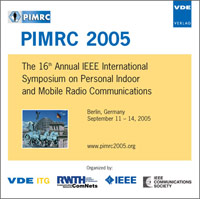Sum-Rate Maximizing Decompositon Approaches for Multiuser MIMO-OFDM
Konferenz: PIMRC 2005 - 16th Annual IEEE International Symposium on Personal Indoor and Mobile Radio Communications
11.09.2005 - 14.09.2005 in Berlin, Germany
Tagungsband: PIMRC 2005
Seiten: 5Sprache: EnglischTyp: PDF
Persönliche VDE-Mitglieder erhalten auf diesen Artikel 10% Rabatt
Autoren:
Tejera, Pedro; Utschick, Wolfgang; Nossek, Josef A. (Institute for Circuit Theory and Signal Processing, Munich University of Technology, Arcisstraße 21, 80333 Munich, Germany)
Bauch, Gerhard (DoCoMo Euro-Labs, Landsbergerstr. 312, 80687 Munich, Germany)
Inhalt:
In the work at hand, decomposition approaches are investigated for the downlink of a multiuser MIMO setting. The focus is on approaches that use successive encoding to eliminate part of the interference between users or information streams. We start reviewing the well known zero-forcing with successive encoding (ZF-SE) approach and generalize the basic idea behind this technique to arrive at a block ZF-SE that can be applied to the case of users with multiple antennas exploiting their cooperation capability. Aiming at a maximization of the achievable sum-rate we elaborate on the ZF-SE and block ZF-SE approaches to come up with the ZF-SE with successive allocation method (ZF-SESAM) and the cooperative ZF-SE with successive allocation method (CZF-SESAM), respectively. This two approaches proceed successively selecting at each step a user to which the next spatial dimension is assigned. Specifically, we propose a largest gain criterion for this selection and provide some rationale for that. Using an OFDM transmission scheme, Tomlinson-Harashima precoding and a common bit loading algorithm we compare the sum-rate achieved by the different approaches. Finally, some simulation results show that in a large MIMO-OFDM system with a moderate number of users even the weakest user can profit from the increase in sum-rate if compared to a maximally fair system, where the same number of dimensions is assigned to every user.


